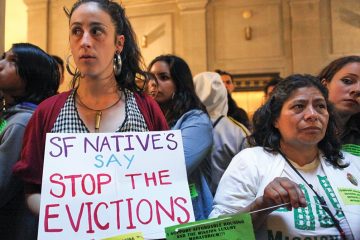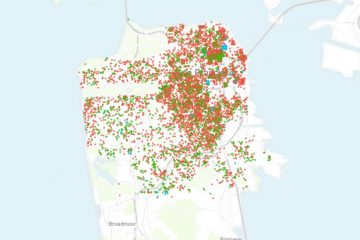Get me out of here! A tenant’s guide to breaking a lease
Ask a Tenants Right’s Lawyer is your chance to learn how to survive as a renter in San Francisco. Attorney Daniel Wayne has the information you need to keep you in your home. This month’s topic: breaking a lease early. Got a question? Send an email to alex@brokeassstuart.com and we will forward it on.

Most of the time when you move into an apartment you sign a written lease with your new landlord. Most leases are for one year. If you live in San Francisco, your tenancy likely comes with eviction protections, meaning you don’t have to move out when the year is up. But what happens if you want to move before your lease is over? Inevitably situations can occur in life or with your living situation that may cause you to want to move out early. Here, we’ll discuss some common scenarios for breaking a lease, and a rundown of best practices for renters. As always, each situation is different and we recommend consulting with a tenant’s rights counselor or attorney before jumping into action.
The basics of rental agreements in California
Before jumping into breaking a lease, it’s important to discuss some lease basics. First, there are two common types of rental agreements 1) fixed-term leases, and 2) month-to-month leases. Note that there is no requirement that your lease be in writing, though it can certainly make things easier when disputes arise. A “fixed-term” lease is just what it sounds like: it covers a specific period of time. Most residential leases are fixed term leases, and most of them are for twelve months. r.
A lease agreement is a legally binding contract. Both the tenant and the landlord have legal obligations as a result of entering into a lease. Your landlord, for example, has an obligation to provide you with a livable space, and you have an obligation to pay your rent. Your lease agreement is your promise to live in your apartment for the time period specified. If you need to move out before your lease term is up you are breaching your contract and your landlord may have grounds for damages. Of course, the question then is why are you moving out?
Breaking a lease for personal reasons
For whatever reason, it’s sometimes necessary to move before your lease is up. You’ve found a great job in another state, or your relationship has ended, or it turns out the neighborhood isn’t a good fit. We get it. Unfortunately, your landlord may not.
Tenants who break a lease for reasons unrelated to problems with their apartment are technically liable for paying rent for the duration of the lease. For instance, if you move out in month seven of a twelve-month lease, you may be liable for the extra five months of rent, even if you give extensive written notice of your move-out.
However, your landlord cannot simply sit back and wait for those last five checks to roll in. And they certainly can’t ask you to cough up the five months of rent all at once. Rather, your landlord has what’s called a “duty to mitigate” their damages in these situations. Civil Code 1951.2 spells out a landlord’s (aka “lessor’s”) responsibilities. Under this law, a landlord is required to make a good-faith effort to find replacement tenants as soon as they are informed of your departure, and is only allowed to charge you for any time the apartment sat vacant (within reason). Given that this is San Francisco and apartments tend to move faster than Bitcoin did in 2017, most landlords are going to have a tough time claiming it took them multiple months to find a replacement.
Also of note is that your landlord is not entitled to make a profit above your lease amount, but just to recoup what you would have paid in rent. So, if they list your apartment for hundreds or thousands of dollars above what you were paying and can’t find someone to sign on, you may have an argument that they did not make a reasonable effort.
Often, rather than seek the full amount of a term lease, landlords will attempt to retain a tenant’s security deposit, or send the tenant a bill for some arbitrary amount as a penalty for breaking a lease. As described above, early-termination fees are permitted only when the landlord can demonstrate that they have sustained actual damages due to the tenant’s departure.

What if I need to move because of problems with the property?
On the flip side, if you are moving out because of severe problems in your apartment, you may be in a very different situation. California tenants are legally entitled to break a lease without notice in cases where a landlord has failed to provide a safe, secure, and habitable unit. California Civil Code 1941.1 lists the affirmative characteristics of rental property, such as heat and hot water, effective weatherproofing, and grounds free of rodents or other vermin.
If your unit is so bad that you need to break your lease, the first step is to communicate with your landlord in writing to document any problems and request repairs.
If you’re planning on moving, it doesn’t hurt to also complain to your city’s department of building inspection (for general building problems) and/or the department of public health (suitable in cases of mold, mildew, or vermin). This will provide you with further documentation of existing habitability problems and the landlord’s failure to repair.
While it may be within your rights to break the lease, it doesn’t hurt to give as much notice as possible. Again, if you end up in small claims court, it will behoove you to come across as reasonable and as though you’re acting in good faith.
Finally, if you’re moving because of an uninhabitable unit, you potentially have a lawsuit based on constructive eviction. Discuss your options with a tenant’s attorney.
What if I need to break a lease because of domestic violence, stalking, or military duty?
Victims of domestic violence or stalking have special rights to break their lease. So do some military personnel.
California law protects tenants and family members who need to move because they’ve been subject to abuse, domestic violence, stalking, or human trafficking. Civil Code 1946.7 outlines the rights of victims to break their lease without penalty. In these cases, tenants may need to provide documentation such as a police report, temporary restraining order, or statement from a social worker. The law provides specific instructions for documentation.
Domestic violence shelters, tenants rights groups, and legal aid centers can help survivors and their families navigate these situations.
Members of the armed forces may also break a lease without penalty. If you are a member of the “uniformed services” who has entered active duty after signing a lease, you can move out with 30 days notice under federal law.
What happens if my landlord seeks damages against me?
Given the Bay Area’s crazy rental market, it’s usually not difficult for landlords to find new renters. But that doesn’t stop landlords from bringing tenants to small claims court in order to recover their lost rent. And while it’s the landlord’s responsibility to try to minimize their losses, the onus is on the tenant to demonstrate the landlord failed to do so.
In other words, tenants who break a lease may find themselves in the position of proving to a small claims judge that their landlord failed to make a good-faith effort to find new tenants. One simple way of doing so is for the departing tenant to line up a few interested applicants before they vacate. Just make your own Craigslist ad, host an open house, and send your landlord an email or letter with the contact information of a few prospective renters. If you end up in small claims court, this correspondence can serve as evidence that your landlord could have rented the place, but failed to.








